|
|
|
Sort Order |
|
|
|
Items / Page
|
|
|
|
|
|
|
| Srl | Item |
| 1 |
ID:
123507
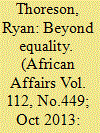

|
|
|
|
|
| Publication |
2013.
|
| Summary/Abstract |
In the decade after apartheid, South Africa became well-known for the unprecedented rights and recognition it afforded to lesbian, gay, and bisexual persons. This article explores the legal and social battles fought by South Africa's trans and intersex activists in the aftermath of the democratic transition, and the ways in which they are meaningfully distinct from the conventional narrative of the post-apartheid LGB movement. In particular, I highlight three areas of divergence - an emphasis on regional advocacy, a focus on micropolitics, and a facility with multiple discourses - that have been central to trans and intersex advocacy. These features of trans and intersex struggles caution against any generalizations about sexuality and law in South Africa. As the twentieth anniversary of the democratic transition approaches, the counternarrative of trans and intersex advocacy merits closer attention as a model for organizing, agitating, and building a movement in contemporary South African politics.
|
|
|
|
|
|
|
|
|
|
|
|
|
|
|
|
| 2 |
ID:
123508
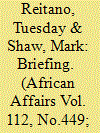

|
|
|
|
|
| Publication |
2013.
|
| Summary/Abstract |
SOMALIA IS NAVIGATING THE MOST PROMISING LANDSCAPE for peace and stability that the blighted country has seen in more than two decades. The successful political transition that culminated in the creation of a federal republic, the election of a broadly representative national government headed by a cadre of invested civil society leaders, and a rollback of the militant terrorist group Al-Shabaab are promising signs for the future. However, there are a number of factors that will restrict the capacity of the central state to coalesce effectively and assert its role. Al-Shabaab, while eroded and increasingly fragmented, still has considerable capacity to trigger violence and instability, as the June car bombing of the UN compound demonstrated. The structure of the state remains incomplete, with little progress on formalizing the constitution and establishing the electoral process, and a number of major points of contention remain, including the movement to establish a new regional Jubaland state to the west of Mogadishu.
|
|
|
|
|
|
|
|
|
|
|
|
|
|
|
|
| 3 |
ID:
123502
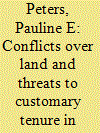

|
|
|
|
|
| Publication |
2013.
|
| Summary/Abstract |
The currently intense debate about 'land grabs' or 'land investment' in Africa has reinforced the significance of relations around land on the continent. This article argues that holders of land under customary tenure face increasing threat and that the role of foreign investors must not obscure the centrality of national agents - governments, political authorities and private actors - in land deals. The article first outlines the historical heritage of the colonial construction and post-colonial reproduction of customary tenure and its denial of full property to customary land-holders. The second part considers the escalating competition and conflict centered on land; the increase in land transfers implicated in the pervasive social conflict focused on land; and the associated rise in social inequality and contestation over belonging and citizenship. All these processes intensify the vulnerability of customarily held land in face of an escalation in efforts to acquire landed resources. The third and final part discusses 'land grabs', the most recent surge of international interest in African land, and the equally significant appropriation of land by national agents. The article concludes that the land question in contemporary Africa has to be linked to the dynamics of social transformation and inequality at multiple levels - global, regional, national, sub-national - that are reshaping not merely access to landed resources but the very bases of authority, livelihood, ownership and citizenship.
|
|
|
|
|
|
|
|
|
|
|
|
|
|
|
|
| 4 |
ID:
123506
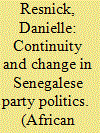

|
|
|
|
|
| Publication |
2013.
|
| Summary/Abstract |
Senegal's 2012 presidential and legislative elections reaffirmed the country's longstanding reputation as one of Africa's most stable democracies. The elections also represented a critical juncture for the country's party system, demonstrated by the use of new campaign techniques as well as the gradual exit from the political scene of an older generation of elites. At the same time, this article argues, the elections revealed continuing weaknesses within the party system, including low levels of institutionalization and the limited ability of the opposition to mobilize key constituencies, such as underemployed urban youth. These trends are demonstrated through disaggregated election data that show a high degree of electoral volatility and party de-alignment as well as low levels of voter turnout. Thus, while Senegal has now achieved the two rounds of party turnover often deemed to be an important indicator of democratic consolidation, the elections also revealed that a vibrant, pluralistic party system can nonetheless fail to engage citizens over time.
|
|
|
|
|
|
|
|
|
|
|
|
|
|
|
|
| 5 |
ID:
123505


|
|
|
|
|
| Publication |
2013.
|
| Summary/Abstract |
This article examines the production, circulation, and interpretation of regulatory documents in contemporary Mozambique in order to highlight their central importance to processes of governance. The empirical focus is on orientações superiores - written and oral documents issued by figures and institutions of authority with the intention of advising on procedures for policy formulation and implementation. By producing orientações superiores in a way that leaves their intent ambiguous and their status provisional, party and state officials shift the focus of policy making from substance to process. In this way, bureaucratic authority is produced and reinforced through the manipulation of the timing of policy implementation. This perspective expands current understandings of African governance that on the whole have been limited to the analysis of the effectiveness of African institutions and policies, leaving the tactical effects of ambiguity, timing, and provisionality in policy implementation undertheorized.
|
|
|
|
|
|
|
|
|
|
|
|
|
|
|
|
| 6 |
ID:
123504


|
|
|
|
|
| Publication |
2013.
|
| Summary/Abstract |
Ghana has recently joined the ranks of oil-producing states with a projected output of 120,000 barrels per day. This has greatly elevated hopes among the general public, but also sparked fears of a 'Nigerian scenario' in which oil becomes a problem rather than a solution. This article argues that Ghana, as a latecomer to the oil industry, may possess a structural immunity against the natural resource curse. The argument centres on three main factors: the country's stable political system, its relatively robust and diversified economy, and the strength of civil society. As a result, the usual symptoms linked to oil extraction across the developing world are unlikely to turn the country upside down. Instead, we suggest that the 'curse' should be perceived as a treatable 'disease'. The article pursues this analogy by showing that, since the discovery of oil, Ghana has been strengthening its 'immune system' through a new legal framework, improvements in transparency and accountability, and modest attempts to strengthen non-resource sectors of the economy.
|
|
|
|
|
|
|
|
|
|
|
|
|
|
|
|
| 7 |
ID:
123503
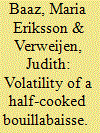

|
|
|
|
|
| Publication |
2013.
|
| Summary/Abstract |
In early 2012, Congolese army deserters formed the M23 rebel movement. This article analyses the insurgency and other armed group activity in the eastern DRC in the light of the politics of rebel-military integration. It argues that military integration processes have fuelled militarization in three main ways. First, by creating incentive structures promoting army desertion and insurgent violence; second, by fuelling inter- and intra-community conflicts; and third, by the further unmaking of an already unmade army. We argue that this is not merely the product of a 'lack of political will' on behalf of the DRC government, but must be understood in the light of the intricacies of Big Man politics and Kinshasa's weak grip over both the fragmented political-military landscape in the east and its own coercive arm. Demonstrating the link between military integration and militarization, the article concludes that these problems arise from the context and implementation of integration, rather than from the principle of military power sharing itself. It thus highlights the crucial agency of political-military entrepreneurs, as shaped by national-level policies, in the production of 'local violence'.
|
|
|
|
|
|
|
|
|
|
|
|
|
|
|
|
|
|
|
|
|